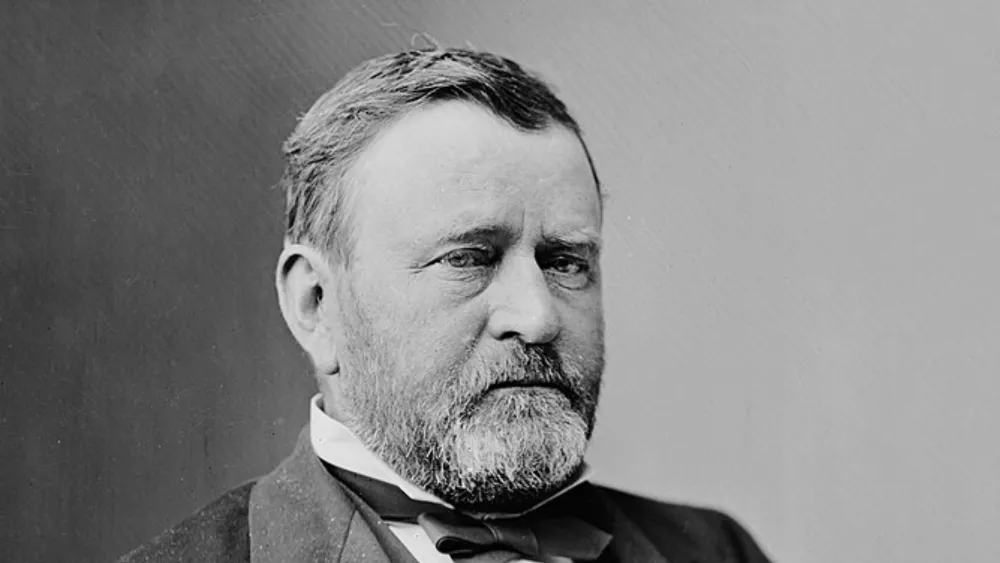Ulysses S. Grant stands out as a towering figure in American history, where individuals rarely ascend from obscurity to iconic heroism. He became one of the most prominent military leaders in the Civil War and the 18th President of the United States. His life and legacy illustrate resilience, determination, and the indomitable American spirit.
General Grant’s extraordinary journey highlights the depth of his character, shedding light on the man behind the legend.
From Tannery Business to West Point
Hiram Ulysses S. Grant, born on April 27, 1822, in Point Pleasant, Ohio, subsequently changed his name to Ulysses S. Grant when he enrolled at West Point due to a typing error. This unintentional change would pave the way for a historical figure to emerge and impact the course of American history.
Grant’s early life unfolded in a small town, with his father’s tannery business providing the family’s livelihood. Young Ulysses exhibited an early affinity for horses, often working with them, a passion that would prove significant in his future.
However, his life took a dramatic turn when he was accepted to the United States Military Academy at West Point in 1839. This change represented a significant detour from the typical course for a young man from a low-income family. At West Point, Grant’s leadership abilities began to shine through.
While his academic performance in most subjects was unremarkable, he truly excelled in the realm of horsemanship and military strategy. His time at the academy honed his innate talents and laid the foundation for an exceptional path.
The Mexican-American War
General Grant’s first notable military experience came during the Mexican-American War (1846-1848), a conflict that allowed the young officer to distinguish himself on the battlefield. During this war, he showcased outstanding bravery and leadership.
In the crucible of warfare, General Grant began to develop the tenacity and resourcefulness that would serve him well in the coming Civil War.
However, the years following the Mexican-American War proved to be a stark contrast to his earlier successes. General Grant’s military career stagnated, and he eventually decided to leave the U.S. Army in 1854.
Transitioning to civilian life, he faced several personal and financial challenges. These struggles pushed him to the brink. Struggling with poverty and alcoholism, Grant’s life entered a period of darkness and uncertainty.
Ulysses S. Grant Takes The Lead
General Grant returned to the service in 1861 as a volunteer and eventually attained the rank of major general. After learning about his early victories in fights like Fort Henry and Fort Donelson, President Abraham Lincoln was interested in him. General Grant’s determination to fight led to his appointment as the Union Army’s Western Theater commander.
General Ulysses Grant’s most significant achievements came during the Vicksburg Campaign and the Battle of Gettysburg, where he played pivotal roles in turning the tide of the war in favour of the Union.
His relentless pursuit of Confederate General Robert E. Lee during the Overland Campaign and the siege of Petersburg demonstrated his military brilliance. So, it earned him the nickname “Unconditional Surrender” Grant.
Appomattox Courthouse and Confederate Surrender
The most famous moment in General Ulysses Grant’s military career may have occurred on April 9, 1865. It took place at Appomattox Courthouse when he presided over General Robert E. Lee’s historic surrender which marked the end of the American Civil War.
This crucial occasion signaled the beginning of the Confederacy’s demise and the commencement of the nation’s healing process.
General Grant’s conduct during the surrender was extraordinary. Instead of demanding unconditional surrender, he showed commendable magnanimity in victory. He offered generous and respectful conditions to Lee and his troops.
This gesture of compassion and reconciliation was a testament to Ulysses S. Grant’s character and commitment to bringing the nation back together after years of bitter conflict.
President Ulysses S. Grant and His Vision of Peace
President Grant established the tone for the post-war era by offering an olive branch to the fallen Confederate army. His deeds conveyed a potent message of peace and forgiveness, essential in mending a fractured nation’s scars.
His leadership in this critical moment helped pave the way for the challenging process of Reconstruction and the reunification of the United States. It is a testament to his leadership and vision that, even in victory, he prioritized national healing over vengeance.
Ulysses S. Grant on Global Journey of Acclaim
After leaving the presidency in 1877, President Ulysses S. Grant embarked on a world tour that earned him great acclaim and admiration internationally. His travels took him to Europe, Asia, and the Middle East, where he was received with the honors befitting a hero.
Crowds flocked to see the man who had played a pivotal role in preserving the United States during the Civil War. During this time, Grant also turned his attention to writing. He penned his memoirs, widely regarded as some of the finest military autobiographies ever written.
These memoirs, titled “Personal Memoirs of Ulysses S. Grant,” were not only an opportunity for Grant to reflect on his life and experiences but also a means to provide financial security for his family. They were completed just days before his death and remained a testament to his literary and intellectual prowess.
Moreover, his commitment to civil rights has earned him a place of honor in the annals of American history.
Ulysses S. Grant’s life and legacy are a testament to the enduring spirit of a nation that can overcome adversity and division to strive for a more perfect union.

A Nation’s Unlikely Hero
The life of Ulysses S. Grant is a remarkable American story of triumph over adversity. From his humble beginnings to his rise as a military hero and President, Grant’s journey is a testament to the enduring spirit of America.
His leadership during the Civil War and his efforts toward reconciliation in the post-war period have left an indelible mark on the nation’s history.
Ulysses S. Grant, the unlikely hero, will forever be remembered as a key figure in shaping the United States into the nation it is today.




